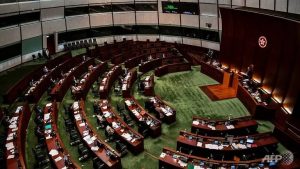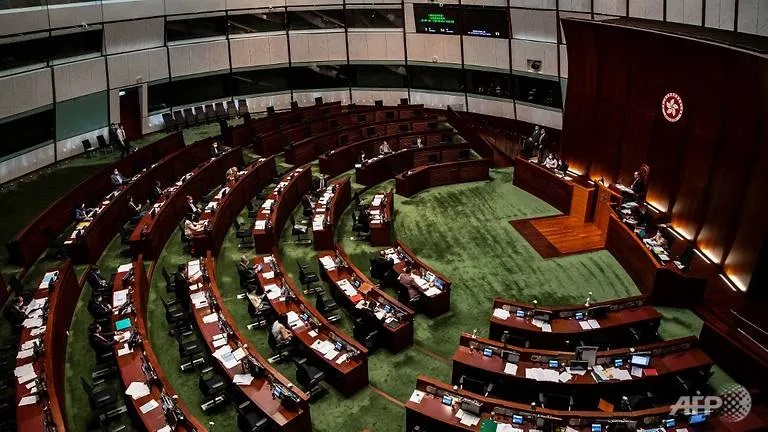
Hong Kong Legislative Council members prepare to vote on a law that bans insulting China’s national anthem in Hong Kong on Jun 4, 2020.
HONG KONG: Hong Kong’s Legislative Council passed a controversial Bill on Thursday (Jun 4) that would make disrespecting China’s national anthem a criminal offence.
Lawmakers approved the Bill with 41 in favour and one against, but the chamber’s pro-democracy faction refused to cast their votes and instead shouted slogans denouncing the law.
The Bill will govern the use and playing of the Chinese national anthem.
This includes provisions that threaten to punish those who insult the anthem with up to three years jail and with fines of up to HK$50,000 (US$6,450).
The Bill states that “all individuals and organisations” should respect and dignify the national anthem and play it and sing it on “appropriate occasions”.
It also orders that primary and secondary school students be taught to sing it, along with its history and etiquette.
PROTESTS BREAK OUT IN CHAMBER
Emergency services were called to the Legislative Council on Thursday after two pro-democracy lawmakers threw foul-smelling liquid in protest against the Tiananmen Square incident 31 years ago.
Lawmakers Eddie Chu and Ray Chan rushed to the front of the chamber during a debate over the national anthem Bill, splashing the reeking fluid as guards grappled with them.
Both men were removed from the chamber shortly after.
During the debate on Thursday, pro-establishment lawmakers had vetoed most amendments to the anthem Bill proposed by democrats.
The passing of the Bill comes as thousands of people are set to ignore COVID-19 regulations to take part in an annual vigil for the Tiananmen Square incident in 1989.
Protesters and pro-democracy politicians say the national anthem Bill represents the latest sign of what they see as accelerating interference from Beijing in the former British colony.
Britain handed Hong Kong back to Chinese rule in 1997 with guarantees that the city’s core freedoms and way of life would be protected under a “one country, two systems” formula, which Beijing says it respects.



